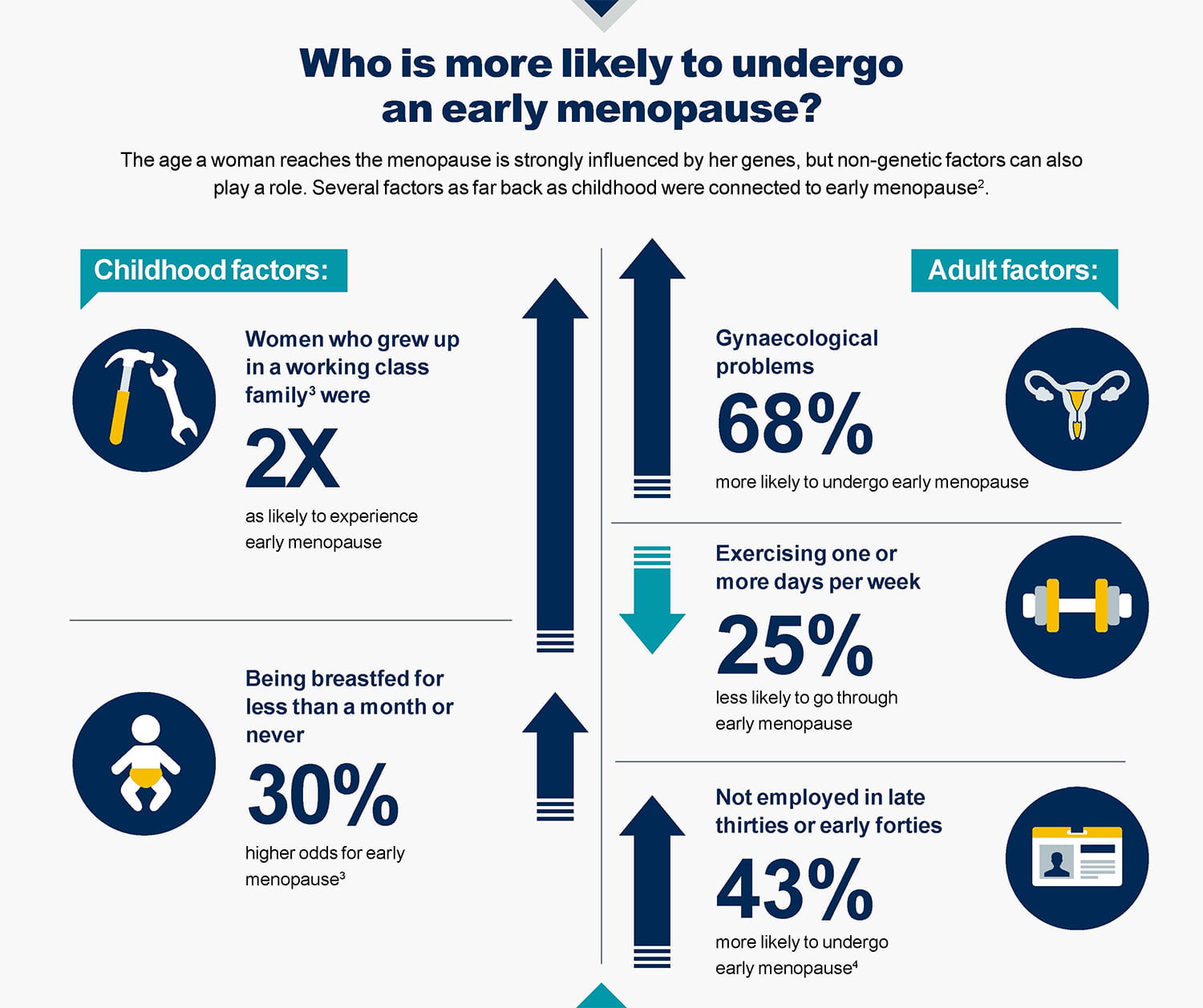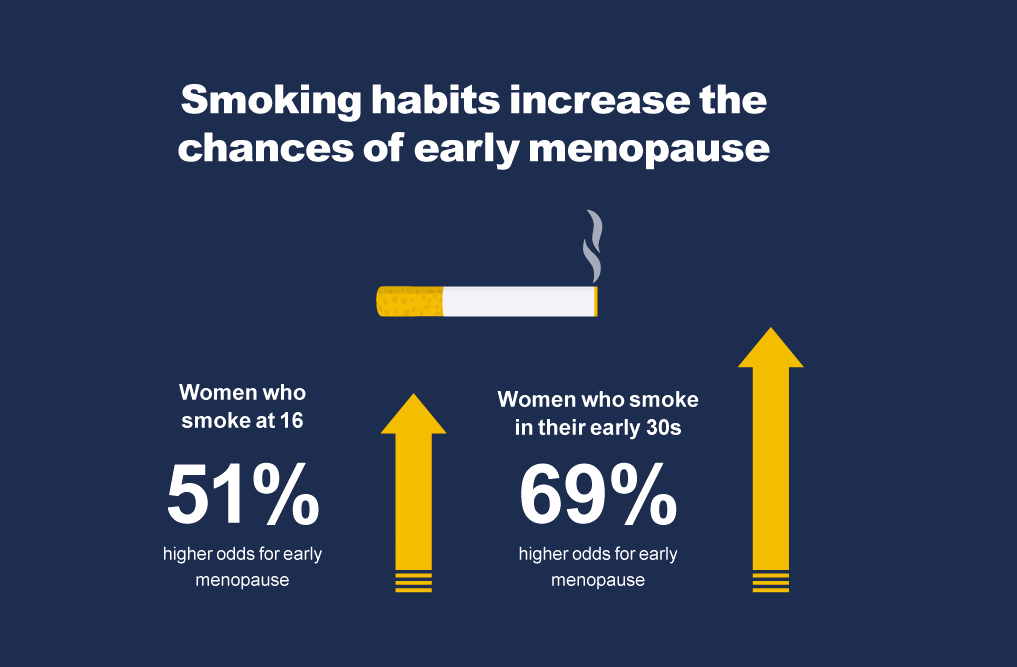The age a woman reaches the menopause is strongly influenced by her genes, but our research suggests that non-genetic factors can also play a role.
Menopause usually occurs between 45 and 55 years of age. If menopause occurs before the age of 45, it is referred to as ‘early menopause’.
Our research looks specifically at early menopause that occurs spontaneously, but menopause can also occur following certain surgeries, medications or other treatment.
Somewhere between 5 and 10% of women experience early menopause. Women with early menopause are often at higher risk of certain health problems, such as cardiovascular disease, osteoporosis, type 2 diabetes, and early cognitive decline.
Accordingly, understanding who tends to reach this milestone earlier than usual is an important step in protecting women’s health. Researchers can then continue to investigate why this might be, and – crucially – how women can be supported during and in the lead up to menopause to protect their health.

Several factors as far back as childhood can be connected to experiencing an early menopause. View the full infographic (Image: Centre for Longitudinal Studies).
Read the full research on the BMC Women’s Health website.
What is the menopause?
- Menopause is when periods permanently stop due to reduced functioning of the ovaries, leading to lower levels of estrogen and other hormones.
- Menopause includes physical and psychological symptoms, such as hot flushes, difficulty sleeping, heart palpitations, anxiety, low mood, or brain fog.
- Menopause usually occurs between 45 and 55 years of age. If menopause occurs before the age of 45, it is referred to as ‘early menopause’.
- 5 to 10% of women will experience early menopause.
- Women with early menopause are often at higher risk of certain health problems, such as cardiovascular disease, osteoporosis, type 2 diabetes, and early cognitive decline.
Read more about the menopause on the NHS website.
Factors associated with early menopause
Menopause is a natural part of every woman’s lifelong journey of reproductive health, but, as we have seen, the age at which women reach this milestone differs. Researchers suspect the timing of menopause can have roots as far back as infancy, or even in utero. They also think that certain factors can pose more of a risk if they’re experienced at certain stages of life.
Britain’s birth cohort studies are excellent resources to study the menopause because they collect information about their study members from birth through the whole of their lives.
Britain’s birth cohort studies are excellent resources to study the menopause because they collect information about their study members from birth through the whole of their lives.
Using nationally representative data from two generations of women born in 1958 and 1970, we set out to understand what non-genetic factors contribute to women’s likelihood of reaching menopause before age 45.
It’s important to remember that just because certain factors are linked to early menopause, does not necessarily mean they are causing it. For example, it’s possible that smoking has a direct effect on a woman’s reproductive health. However, other factors, like socioeconomic circumstances, may affect things like diet and nutrition or emotional stress, which in turn may affect the age at which women reach the menopause.
We found that women had 30% higher odds of experiencing early menopause if they were never breastfed or breastfed for less than a month, and 24% higher odds if their mothers smoked while pregnant.
Women’s own smoking habits were also linked to early menopause. Women who smoked at age 16 had 51% higher odds of early menopause, compared to those who did not smoke at this age.

Smoking habits increase the chances of early menopause (Image: Centre for Longitudinal Studies)
Women who reported experiencing gynaecological problems by their early thirties were 68% more likely to be menopausal before 45 than their peers, and women who were not in paid work in their late thirties or early forties were also more likely to undergo early menopause than those who were in work at these ages.
A woman’s socioeconomic circumstances growing up were also related. Women whose fathers worked manual jobs were twice as likely as their peers to experience early menopause, compared to those whose fathers worked non-manual jobs. The chances were even higher for women whose fathers didn’t live with them when they were born.
Supporting women
Whatever the age a woman experiences the menopause, much greater support is needed across healthcare and employment.
In 2021, a government call for evidence for a Women’s Health Strategy received over 110,000 responses, including more than 97,000 from individuals sharing personal experiences. Among them, only 9% said they had enough information about the menopause and less than two thirds felt comfortable talking to their doctor about it.
As part of the government’s 10-year women’s health strategy for England that followed, the UK Menopause Taskforce has pledged to improve treatment, education and awareness and workplace support for menopause.
This is badly needed. So far, progress has been slow.
New guidance to GPs from the National Institute for Health and Care Excellence advises that women should be offered talking therapy instead of, or as well as, hormone replacement therapy (HRT) for problematic menopause symptoms. Doctors, MPs and campaigners have said these recommendations belittled symptoms through misogynistic language and could harm the health of women who may need HRT to maintain bone strength and cardiovascular health
Almost 80% of women have reported they receive no support at work with menopause symptoms.
Meanwhile, almost 80% of women have reported they receive no support at work with menopause symptoms, leaving many women feeling that the menopause is a taboo subject that cannot be talked about openly. With menopause resulting in millions of days lost through absenteeism, some women may choose to leave employment rather than ask their employers for support. CLS’ earlier research found that those who report menopausal symptoms spend significantly less time working in their early 50s.
Only by increasing awareness and elevating the importance of women’s health issues can we break the taboos surrounding the menopause across society, so women can make informed decisions about their health.
- By Darina Peycheva, Alice Sullivan, Meghan Rainsberry and Ryan Bradshaw.
- This article was originally published on the IOE Blog website.





